Local
In reversal, Kameny heir says no ashes for public memorial
Dramatic shift leaves fate of cemetery plot unclear
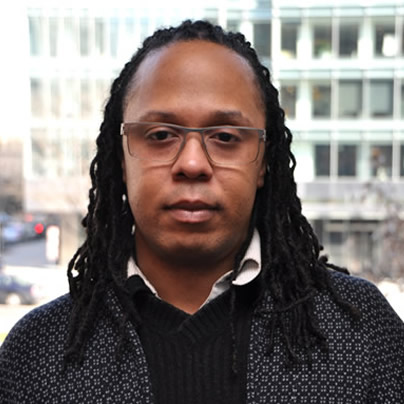
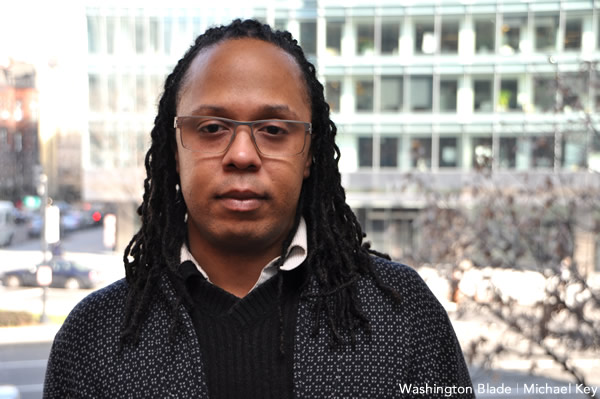
Timothy Clark, who earlier said he would release half of Frank Kameny’s ashes to be interred at Congressional Cemetery, changed his mind and now plans to inter the ashes at an undisclosed location. (Washington Blade photo by Michael Key)
Timothy Clark, the man D.C. gay rights pioneer Frank Kameny named in his will as heir to his estate, has released a statement through his lawyers saying he has decided to inter Kameny’s ashes at an undisclosed location.
The statement released Feb. 20 by the D.C. law firm Ackerman Brown represents a dramatic change from Clark’s earlier statements, including comments in an interview with the Blade in 2012, that he would release half of the ashes for burial at a memorial site in the city’s historic Congressional Cemetery. He reiterated his intent to inter ashes in D.C. in another Blade interview in July 2013.
“We reached an agreement on that so I’m going to keep the burial plot,” Clark said at that time. “I just have to decide on when I want to have something,” he said in referring to a burial ceremony at Congressional Cemetery.
Clark, 37, Kameny’s housemate and longtime friend, had said in the months following Kameny’s death on Oct. 11, 2011, that he planned to keep some but not all of the ashes for his personal reflection and possible interment elsewhere. Kameny died in his Washington home of natural causes at the age of 86.
“The decision regarding interment of Frank Kameny’s ashes rests solely with Timothy Clark, the Personal Representative of the Estate of Franklin E. Kameny,” the Ackerman Brown statement says.
“Mr. Clark has decided to inter the ashes at an undisclosed location. Mr. Clark asks the community to respect his wishes and his privacy,” the statement says.
Clark’s announcement through his attorneys comes more than two years after the local LGBT charitable group Helping Our Brothers and Sisters (HOBS) purchased a burial plot for Kameny’s ashes at Congressional Cemetery.
HOBS and some of Kameny’s gay activist friends and supporters who worked with the group to choose the location of the cemetery site said it would become a monument to Kameny’s legacy and a place where people could go to pay their respects to a nationally known figure considered a hero to the LGBT rights cause.
The site they selected is located just behind the gravesite of the late gay rights leader and U.S. Air Force Sgt. Leonard Matlovich, who, with Kameny’s assistance in 1975, became the first active duty military service member to come out of the closet and challenge the military’s ban on gay service members. Matlovich died in 1987.
A planned ceremony and burial of Kameny’s ashes scheduled for March 2012 was abruptly cancelled at the request of the estate, according to Patrick Crowley, who worked as senior manager of Congressional Cemetery at that time. Lawyers for the Kameny estate wanted HOBS to transfer ownership of the cemetery plot to the estate, Crowley said.
Although HOBS agreed to the transfer, a dispute arose over the terms of an agreement proposed by lawyers for both parties, and negotiations dragged on for nearly two years.
Last July, both sides said a tentative agreement had been reached, raising hopes among Kameny’s friends and admirers that a burial ceremony and the official opening of a Kameny memorial site at Congressional Cemetery would soon take place.
“The estate has always been, and remains willing to work with gay community representatives who knew Frank Kameny in organizing a burial service and appropriate gravesite at which members of the community could pay tribute to Kameny,” said attorney Christopher Brown of Ackerman Brown at that time.
However, no announcement of an agreement emerged since that time. When Ackerman Brown released its statement last week saying Clark decided to inter the ashes at an undisclosed location, neither Ackerman Brown nor HOBS would disclose where things stood with the cemetery plot.
“The estate has no further comment,” said Glen Ackerman, principal partner of Ackerman Brown, in a Feb. 23 email to the Blade.
Matthew Cook, an attorney with the national law firm Fried Frank, which is representing HOBS, sent the Blade a separate statement from HOBS that made no mention of whether ownership of the cemetery plot had been transferred to the estate or whether HOBS would seek to set up another memorial site for Kameny at Congressional Cemetery.
“Dr. Kameny was a true gay rights pioneer and local legend,” the HOBS statement says. “HOBS was proud to work with and for Dr. Kameny during the last years of his life. Of course, as the executor of the Kameny Estate, it is Mr. Clark’s decision where to inter Dr. Kameny’s ashes.”
Veteran D.C. gay activist Paul Kuntzler, who worked with Kameny on gay rights activities beginning in 1962, and San Francisco gay activist Michael Bedwell, a friend of Kameny’s, each told the Blade that the LGBT community should now take immediate steps to arrange for another memorial site for Kameny at Congressional Cemetery, even though the ashes won’t be interred there.
The four local activists and Kameny friends who initiated plans to inter Kameny’s ashes at Congressional Cemetery in early 2012 – Marvin Carter, CEO of HOBS and LGBT rights advocates Charles Francis, Bob Witeck and Rick Rosendall – have declined to comment on Clark’s decision to inter the ashes at another location.
They also declined to comment on what, if anything, they may do to set up a Kameny memorial site at the cemetery now that the ashes are out of the picture.
“Frank Kameny’s monumental legacy may be best remembered by laws he helped overturn, the hateful policies he defeated and the causes of equal rights he unselfishly advanced for the LGBT community,” said Witeck in an email statement on Sunday.
The relationship between the four men and the Kameny estate became strained in 2012 shortly after they announced plans for a Congressional Cemetery memorial site and burial when Clark stated through his attorneys that Clark was never given the courtesy of being consulted about those plans.
Carter, however, has said Clark was informed about the plans and invited to participate in the planned ceremony.
The relationship between the four men and the estate became further strained when the estate filed individual lawsuits against each of them, charging that they took without permission items from Kameny’s house that belonged to the estate shortly after Kameny’s death. The men disputed the allegations, saying Clark along with Clark’s lawyer at the time, Michele Zavos, gave them permission to enter the house and take an inventory of Kameny’s papers and other possessions to arrange for their safe keeping.
The lawsuits, which were filed by Ackerman Brown on Clark’s behalf, were later dropped after undisclosed settlements were reached in three of the cases. The court dismissed the case against Rosendall on grounds that no cause was shown to justify the complaint, according to Rosendall’s attorney, Mindy Daniels.
Upon learning of Clark’s decision to inter the ashes in an undisclosed location, Bedwell expressed concern that Clark, who among other things, inherited Kameny’s house that the estate sold in 2012 for $725,000, was not doing his part to promote Kameny’s legacy.
“Frank’s trust and affection made Mr. Clark a wealthy man,” Bedwell said. “His sacrifices helped make him, like all LGBTs, a freer man,” Bedwell said.
“Now that Mr. Clark has disappeared with Frank’s ashes along with any hopes of his repaying Frank’s extraordinary generous friendship by sharing them for a memorial, I trust that others will create one without them,” he said.
Clark didn’t respond to a phone message from the Blade this week.
In a 2012 interview with the Blade, Clark described himself as a private person who shunned the spotlight, saying he intentionally remained in the background during the 19 years he lived in Kameny’s house.
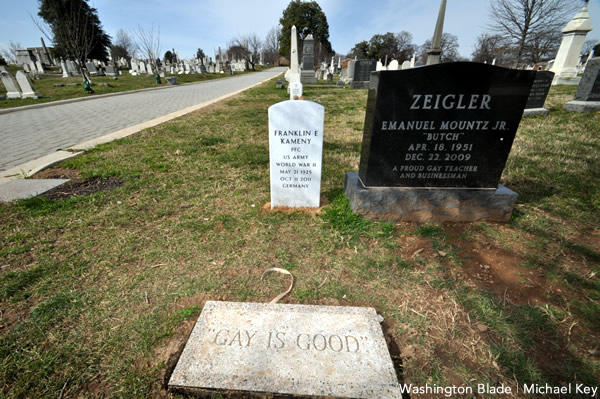
(Washington Blade file photo by Michael Key)
Also remaining unclear this week is what will become of a headstone and separate grave marker that HOBS and the activists working with the group installed at the cemetery site before the dispute with the estate surfaced.
Francis, the founder of the Kameny Papers Project, which arranged several years before Kameny’s death to have Kameny’s voluminous collection of letters and gay rights documents donated to the Library of Congress, obtained the headstone from the U.S. Department of Veterans Affairs.
Francis and others working on the memorial site said the military headstone would recognize Kameny’s role as a World War II combat veteran. The stone is identical to gravestones used for soldiers and veterans buried at Arlington National Cemetery, and is issued free of charge to all deceased military veterans.
HOBS purchased a separate footstone inscribed with the slogan Kameny coined in the 1960s, “Gay is Good.” Carter said HOBS paid for the footstone along with the cemetery plot through funds donated by members of the LGBT community.
HOBS had both stones installed at the gravesite in March 2012 in anticipation that plans for burial of the ashes would move forward as planned.
Cemetery officials later removed the headstone and the “Gay is Good” marker and placed them in storage, saying it was inappropriate for them to remain in place while the ownership of the gravesite was in dispute.
Bedwell, who has played a role in managing the Matlovich gravesite, said he owns a separate plot next to the Matlovich site that he offered to donate for the Kameny burial shortly after Kameny died. HOBS instead chose to buy a plot a short distance away. Now, Bedwell said he is open to donating the plot he owns for a new Kameny memorial site at the cemetery.
“Neither [Clark’s] permission or Frank’s ashes are required for anyone to create a memorial to Frank anywhere,” Bedwell said in a comment to the Blade in October. “Millions more visit Lincoln’s Memorial in Washington every year than his actual gravesite in Springfield, Ill.,” he said.
“I’m confident many would be eager to contribute to the purchase of another marker bearing Frank’s name,” Bedwell said, in the event that the Veterans Administration stone or the “Gay is Good” stone won’t be released by the estate.
Ackerman, while repeating his firm’s written statement that the Kameny estate would have no further comment on Clark’s decision to inter the ashes in a private location, said the estate would welcome inquiries “by anyone” interested in establishing a public memorial for Kameny.
“All they have to do is call us,” he said.
District of Columbia
Three of five LGBTQ candidates win race for DNC delegate from D.C.
32 candidates competed for 13 elected seats in party caucus
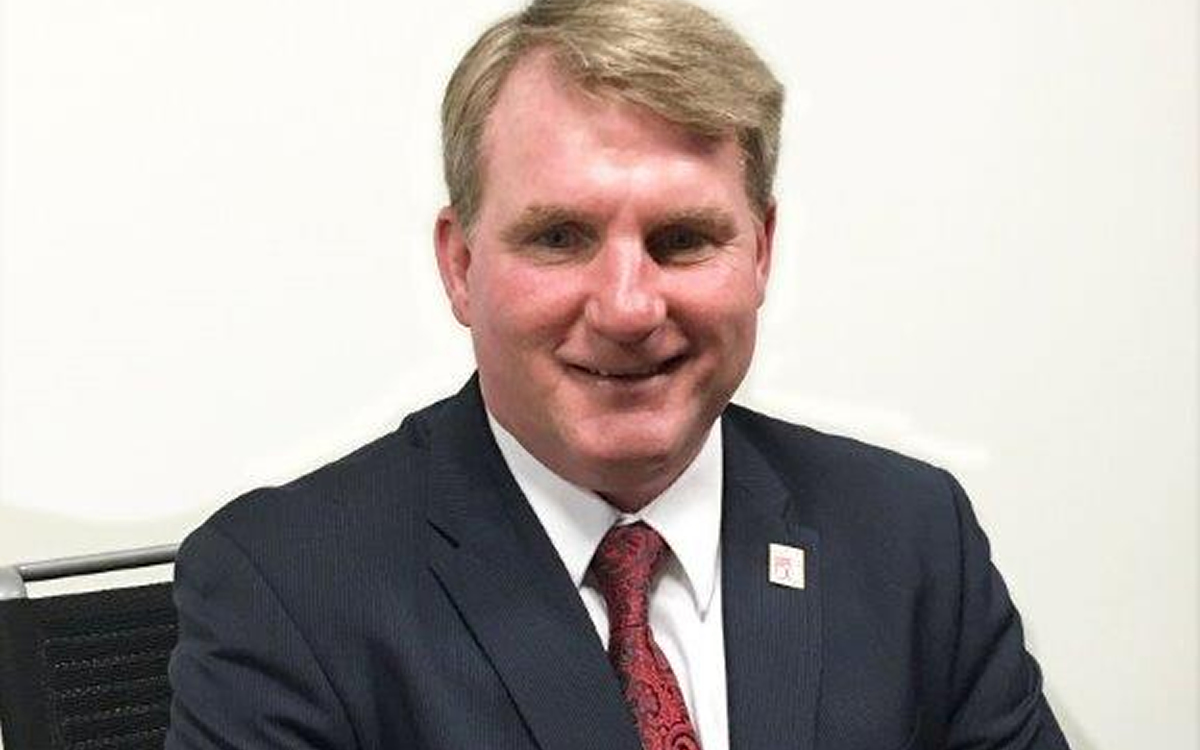
Three out of five known LGBTQ candidates running for election as delegates from D.C. to the Democratic National Convention won their races at an April 20 Democratic Party caucus election held at D.C.’s Walter Washington Convention Center.
Ward 2 gay Democratic activist John Fanning finished in first place with 140 votes and Ward 8 gay Democratic activist David Meadows finished in second place with 127 votes in a race in which six male candidates committed to supporting President Biden were competing for three male seats in a section of the city designated as Congressional District 1, which included registered Democratic voters in Wards 1, 2, 6, and 8.
Ward 7 gay Democratic activist Jimmie Williams won his race, finishing in third place with 200 votes in a race in which eight male candidates committed to President Biden competed for four male seats in the Congressional District 2 section of the city that included Wards 3, 4, 5, and 7.
Gay Democratic activist Felipe Afanador lost his race, finishing in sixth place with 47 votes in the Congressional District 2 election for male candidates backing Biden. It couldn’t immediately be determined which of the four wards in District 2 he is from.
The Washington Blade didn’t learn about Afanador’s status as an LGBTQ candidate until the Capital Stonewall Democrats announced it one day before the April 20 party election in an email statement.
In the Congressional District 2 race among female candidates, in which eight candidates competed for three female seats, transgender rights advocate and Ward 3 Democratic Party activist Monika Nemeth lost her race, finishing in sixth place with 49 votes.
The five LGBTQ candidates were among 32 candidates competing for just 13 elected delegate positions in D.C. D.C. will have a total of 51 delegates to the Democratic Convention, but the other 38 include elected officials and party leaders who are considered “automatic” or appointed delegates. The Democratic Convention will be held in Chicago Aug. 19-23.
Observers familiar with the April 20 party caucus election said Fanning, Meadows, and Williams had participated in local D.C. Democratic Party events and activities for a longer period than Nemeth and Afanador and appear to have been better known among Democratic voters in their respective wards as well as other wards. Those factors contributed to their receiving significantly more votes than most other candidates, observers have said.
In his candidacy statement posted on the D.C. Democratic Party website, Afanador said he worked on the 2020 Biden presidential election campaign in Pennsylvania. His LinkedIn page says in 2022 he began work in Washington for the Biden administration as an official in the U.S. Department of Agriculture.
Nemeth is a past president of D.C.’s Capital Stonewall Democrats, the city’s largest LGBTQ local political group, and has been an active member of the D.C. Democratic State Committee, the local party governing body. She served as a Biden delegate at the 2020 Democratic National Convention.
“It is important for our D.C. delegation to have strong LGBTQ representation,” Capital Stonewall Democrats said in its April 19 statement. “There are five LGBQ candidates running to be delegate, and Capital Stonewall Democrats asks that our members support each one,” the statement says.
“Unfortunately, they fell short, but they and all queer Democrats are welcome to attend and participate in convention events and activities sponsored by the national and local party,” Meadows told the Blade in referring to Nemeth and Afanador. “Our shared goal is to unite behind the Biden-Harris ticket to protect our LGBTQ rights from being dismantled by Donald Trump and the GOP,” Meadows said.
“Running for District Delegate is one of the most grassroots efforts,” Fanning told the Blade. “It’s very beneficial to align yourself on a slate with community leaders that have either previously run for District Delegate or have developed a constituency in their community from other civic engagements,” he said, referring to possible reasons for his, Meadows, and Williams’s election victory.
Aside from the D.C. elected LGBTQ delegates, two prominent D.C. LGBTQ Democratic leaders will be appointed as delegates to the 2024 Democratic National Convention in their role as members of the Democratic National Committee from D.C. They are Claire Lucas, a highly acclaimed Democratic Party and LGBTQ rights advocate and party fundraiser; and Earl Fowlkes, one of the lead organizers of D.C.’s annual Black LGBTQ Pride celebration and former president of the Capital Stonewall Democrats. Both are committed to supporting President Biden as the Democratic nominee for re-election.
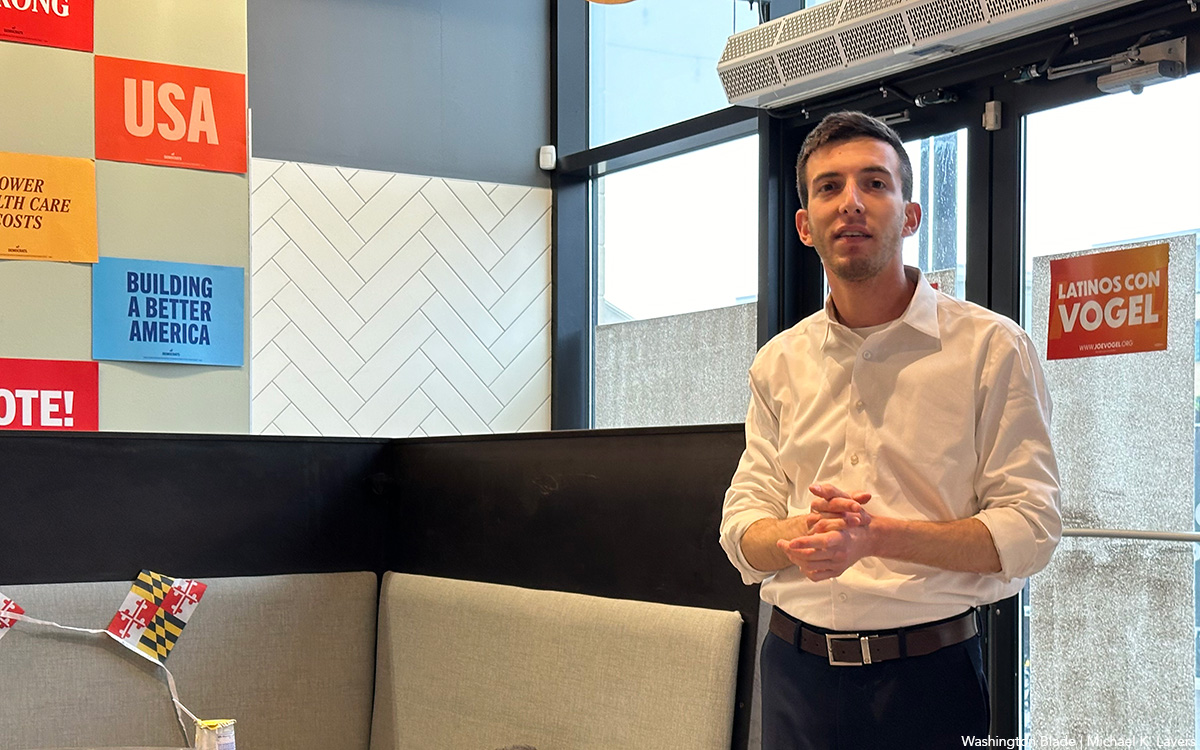
GAITHERSBURG, Md. — Maryland state Del. Joe Vogel (D-Montgomery County) on Friday held a “Big Gay Canvass Kickoff” event at his congressional campaign’s headquarters.
LGBTQ+ Victory Fund Vice President of Outreach and Engagement Marty Rouse and John Klenert, a member of the DC Vote and Victory Fund Campaign board of directors, are among those who participated alongside members of Equality PAC. Vogel spoke before Rouse, Klenert and others canvassed for votes in the area.
“Joe brings a fresh new perspective to politics,” said Gabri Kurtzer-Ellenbogen, deputy field director for Vogel’s campaign.
Vogel, 27, is among the Democrats running for Congressman David Trone’s seat.
Trone last May announced his bid to succeed retiring U.S. Sen. Ben Cardin (D-Md.) in the U.S. Senate.
The Democratic primary is on May 14. Vogel would be the first Latino, the first gay man and first Gen Zer elected to Congress from Maryland if he were to win in November.
“We need a new generation of leadership with new perspectives, new ideas, and the courage to actually deliver for our communities if we want things to get better in this country,” Vogel told the Washington Blade last month during an interview in D.C.
Maryland
Montgomery County police chief discusses arrest of trans student charged with planned school shooting
County executive tells news conference student’s trans identity is irrelevant to criminal charge

Montgomery County, Md., Police Chief Marcus Jones joined other county and law enforcement officials at a news conference on Friday, April 19, to provide details of the police investigation and arrest of an 18-year-old high school student charged two days earlier with threats of mass violence based on information that he allegedly planed a mass shooting at the high school and elementary school he attended in Rockville, Md.
In charging documents and in a press release issued on April 18, Montgomery County Police identified the arrested student as “Andrea Ye, of Rockville, whose preferred name is Alex Ye.”
One of the charging documents states that a friend of Ye, who police say came forward as a witness who played a crucial role in alerting authorities to Ye’s threats of a school shooting, noted that Ye told the witness that Ye identified as the transgender student he wrote about as a character in a 129-page manifesto outlining plans for a school shooting. Police have said Ye told them the manifesto was a fictional story he planned to publish.
At the news conference on Friday, Police Chief Jones and other law enforcement officials, including an FBI official and Montgomery County Executive Marc Elrich, referred to the student as Alex Ye and Mr. Ye. None of the officials raised the issue of whether Ye identified as a transgender man, seven though one of the police documents identifies Ye as a “biological female.”
County Executive Elrich appeared to express the views of the public officials at the news conference when one of the media reporters, during a question-and-answer period, asked Elrich why he and the others who spoke at the news conferment failed to “admit that this individual was transgender.”
“Because it’s not a lead,” Elrich replied, asking if the press and law enforcement authorities should disclose that someone arrested for murder is “a white Christian male who’s heterosexual.” Elrich stated, “No, you don’t – You never publish somebody’s sexual orientation when we talk about this. Why you are focusing on this being a transgender is beyond me. It’s not a news story. It is not a crime to be transgender.”
The reporter attempted to respond but was cut off by the press conference moderator, who called on someone else to ask the next question.
In his remarks at the press conference Chief Jones praised the so far unidentified witness who was the first to alert authorities about Ye’s manifesto appearing to make threats of a mass school shooting.
“Now, this is a situation that highlights the critical importance of vigilance and community involvement in preventing potential tragedies,” Jones said. “I commend the collaborative efforts of the Montgomery County Police Department, the Federal Bureau of Investigation, the Rockville City Police Department, and the Montgomery County Public Schools, as well as Montgomery County Health and Human Services,” he told the gathering.
“Thanks to their swift action and cooperation a potentially catastrophic event was prevented,” Jones said.
Jones pointed out that during the current school year, police have received reports of 140 threats to the public schools in Montgomery County. He said after a thorough investigation, none of them rose to the level where an arrest was made. Instead, police and school officials took steps to arrange for the student making the threats and their parents to take remedial action, including providing mental health services.
“But this case is different,” Jones said. “This case is entirely different that takes it to a different level. It was a concerned witness who brought this matter to light by rereporting the suspect’s manifesto to the authorities. This underscores the value of community engagement and the ‘see something say something’ approach,” he said.
Jones mentioned at the press conference that Ye was being held without bond since the time of his arrest but was scheduled to appear in court for a bond hearing on Friday shortly after the press conference took place to determine whether he should be released while awaiting trial or continue to be held.
In his manifesto obtained by police, Ye writes about committing a school shooting, and strategizes how to carry out the act. Ye also contemplates targeting an elementary school and says that he wants to be famous.
In charging documents reported on by WJLA 7 and WBAL 11, the 129-page document, which Ye has referred to as a book of fiction, included writings that said, in part:
“I want to shoot up a school. I’ve been preparing for months. The gun is an AR-15. This gun is going to change lives tomorrow … As I walk through the hallways, I cherry pick the classrooms that are the easiest targets. I need to figure out how to sneak the gun in. I have contemplated making bombs. The instructions to make them are surprisingly available online. I have also considered shooting up my former elementary school because little kids make easier targets. High school’s the best target; I’m the most familiar with the layout. I pace around my room like an evil mastermind. I’ve put so much effort into this. My ultimate goal would be to set the world record for the most amount of kills in a shooting. If I have time, I’ll try to decapitate my victims with a knife to turn the injuries into deaths.”
-

 District of Columbia5 days ago
District of Columbia5 days agoNew D.C. LGBTQ+ bar Crush set to open April 19
-

 District of Columbia5 days ago
District of Columbia5 days agoReenactment of first gay rights picket at White House draws interest of tourists
-

 South America3 days ago
South America3 days agoDaniel Zamudio murderer’s parole request denied
-

 Opinions5 days ago
Opinions5 days agoOpen or closed? No, not your bar tab









